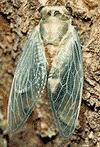- cicada
-
/si kay"deuh, -kah"-/, n., pl. cicadas, cicadae /-dee/.any large homopterous insect of the family Cicadidae, the male of which produces a shrill sound by means of vibrating membranes on the underside of the abdomen.[1350-1400; ME < L cicada]
* * *
Any insect in the order Homoptera that has two pairs of membranous wings, prominent compound eyes, and three simple eyes (ocelli).Most of the 1,500 known species are in the family Cicadidae and are found in tropical deserts, grasslands, and forests. Males produce loud noises by vibrating membranes near the base of the abdomen. Most North American cicadas produce rhythmical ticks, buzzes, or whines, though the "song" of some species is musical. The species are easily distinguishable by song, behaviour, and appearance. Periodic cicadas (species that occur in large numbers in chronologically and geographically isolated broods) appear in regular cycles, including the well-known 17-year cicada (often erroneously called the 17-year locust) and 13-year cicada. The larvae (nymphs) burrow into the ground, where they remain for 17 or 13 years, feeding on juices sucked from roots; they then emerge in large numbers to live aboveground as adults for a single week. Newly emerged adult cicada (Tibicen pruinosa).Richard Parker
Newly emerged adult cicada (Tibicen pruinosa).Richard Parker* * *
▪ insectany of a group of sound-producing insects (order Homoptera) that have two pairs of membranous wings, prominent compound eyes, and three simple eyes (ocelli). Cicadas are medium to large in size, ranging from 2 to 5 cm (0.8 to 2 inches). Male cicadas produce loud noises by vibrating membranes (timbals) near the base of the abdomen. Most North American cicadas produce rhythmical ticks, buzzes, or whines, although in some species the “song” is musical. Eggs are usually laid in woody plant tissues that drop from the plant when, or shortly after, the eggs hatch. Newly hatched nymphs burrow into the ground where they suck juices from roots of perennial plants. Nymphs usually undergo five molts during the several years required to reach maturity. Although not ordinarily considered a pest, the females, if numerous, may damage young saplings during their egg laying.About 1,500 species of cicadas are known. With the exception of two species of hairy cicadas in the family Tettigaretidae that are found only in southeastern Australia, including Tasmania, cicadas belong to the family Cicadidae and are tropical and occur in deserts, grasslands, and forests. In addition to the dog-day cicada (Tibicen and others) that appears yearly in midsummer, there are also periodic cicadas. Among the most fascinating and best-known are the 17-year cicada (often erroneously called the 17-year locust) and the 13-year cicada (Magicicada). These species occur in large numbers in chronologically and geographically isolated broods.The several species are easily recognized by differences in songs, behaviour, and morphology. Males of each species have three distinct sound responses: a congregational song that is regulated by daily weather fluctuations and by songs produced by other males; a courtship song, usually produced prior to copulation; and a disturbance squawk produced by individuals captured, held, or disturbed into flight.Cicadas have been used in folk medicines, as religious and monetary symbols, and as an important source of food. Their song once was considered to forecast weather changes. In China, male cicadas were caged for their song. The cicada appears in the mythology, literature, and music of many cultures, including that of American Indians.* * *
Universalium. 2010.
